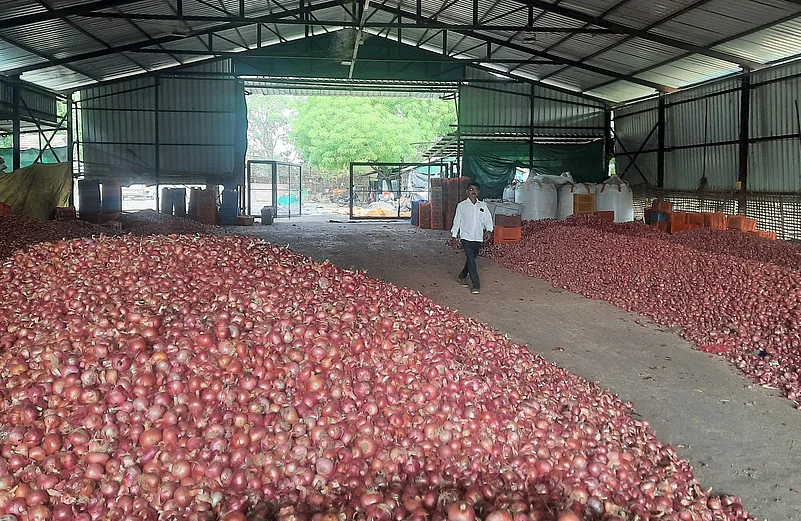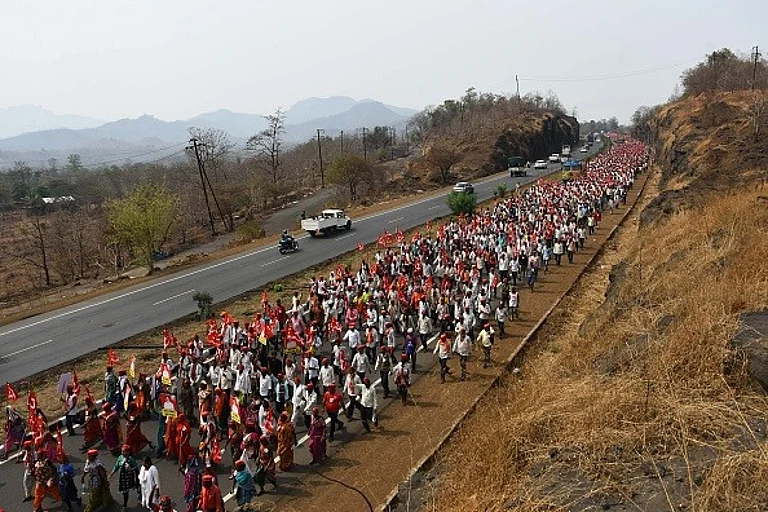The vast, undulating terrain of the Nashik region in Maharashtra, strewn with table-top hills looking like giant, brooding elephants, is carpeted with fields of grape vines, soya, cotton and onion. But the farmers growing the crops have woes to tell, especially the onion growers. A meeting with them at Lasalgaon Onion Market – said to be Asia’s biggest onion mandi – turns animated. “So far governments have fallen because of high onion prices. This time, the government will be hit by low prices,” says a farmer and onion trader. Maharashtra grows about 30 per cent of India’s onions and the Nashik region is the top onion-growing district in the state.
Onion prices have decided elections before. As prices soared, former Prime Minister Indira Gandhi had called the 1980 polls ‘onion elections’. The farmers say that for the fear of rising inflation before elections, the Central government didn’t want onion prices to rise. So in December 2023, it banned onion exports to India’s main markets in the Middle East, South East Asia and Europe. This created a glut in the domestic market and the prices fell. The ban was lifted after six months, just before the Lok Sabha elections were announced but the farmers say the damage had been done. Also, even after lifting the ban, a minimum export price of $550 per tonne, plus a 40 per cent export duty was imposed on onions.
Haridas Pawar is a middle-level onion farmer and trader in Nashik. He says that before the ban, he was getting between Rs 42-45 per kg for onions but after the ban, the price fell to about half. He says the input costs like fertiliser, pesticides, seeds and labour costs have only increased. It will be impossible for the farmers to recover their costs at these prices. “We have gone to the government many times to state our cause but they don’t listen. The farmers here in the Nashik area are very angry with the present government. I will not vote for the Eknath Shinde alliance this time,” he says.
Some traders also bring up nationalist sentiments. They say India’s export ban is Pakistan’s gain as it is a competing country in the world market. “What sort of a policy is it where you let our own farmers suffer and let Pakistan take over our export market? I can understand the need to control domestic prices but the consumer can’t be protected at the cost of the farmer. I don’t think the domestic prices would have gone up too much this time, the onion ban is a knee-jerk reaction from the government,” says Jaydutt Hokkar, a farmer exporter from Nashik.
Maharashtra Chief Minister Eknath Shinde says the onion farmers won’t suffer and that his government is acutely aware of farmers’ problems. He says his government is giving them even more benefits than that set up by the National Disaster Response Force for crops destroyed due to unseasonal rains.
“In the last nearly two years, we have given compensation worth Rs 15,000 crore to farmers. Modi ji is giving the farmers Rs 6,000 annually. We have added Rs 6,000 to that. So the farmers in Maharastra are getting Rs 12,000 in total yearly. Earlier, for crop insurance, farmers used to pay the premium. Now we are paying. If we add up everything, we have spent more than Rs 35,000 crore on farmers. So how can people say that we have not done anything? Only the opposition is saying this,” he says.
How much tears onions bring to the farmers, and the candidates in Nashik, will be known on June 4.





























